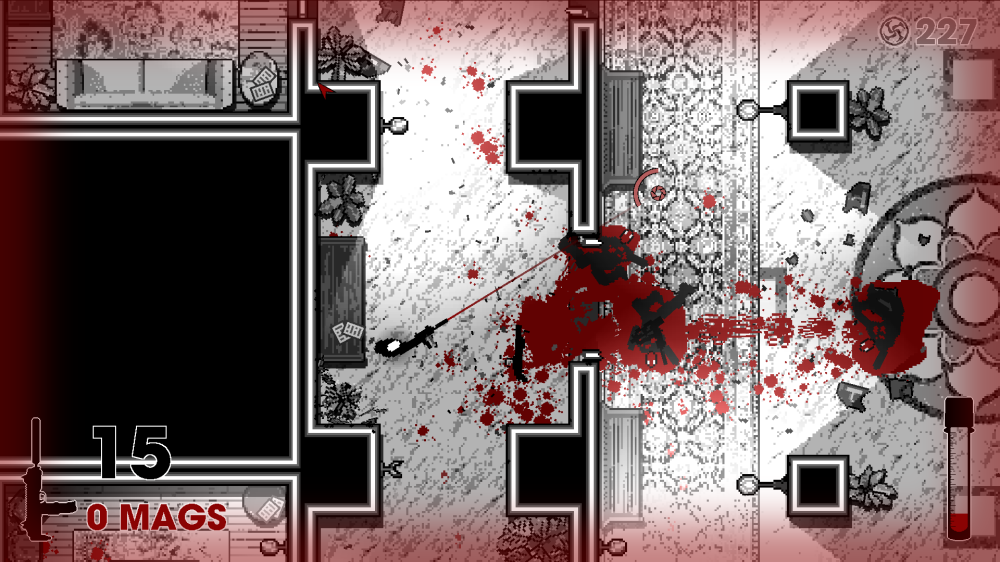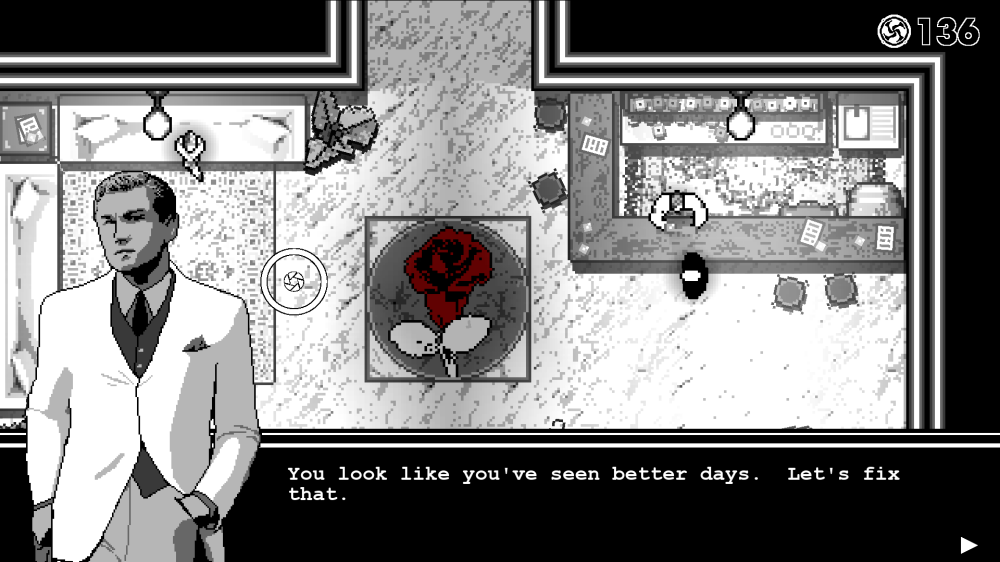Scientists say that we humans form a first impression within seven seconds of meeting our peers. If you were to watch seven seconds of OTXO gameplay footage, your first thoughts may well sound something like “this just looks like a monochromatic Hotline Miami rip-off!” – and you’d be forgiven.
OTXO is a top-down shooter in which you bash open doors, dive into cover, and splatter your enemies’ brains across the floor with a variety of weapons. So far, so familiar, however developer Lateralis Heavy Industries proves that you shouldn’t always judge a book by its cover.
Spending as little as thirty minutes with OTXO should subvert those expectations and reveal a Rogue-lite twist on Dennaton’s breakout indie hit, which gives the game a very different feel despite being functionally quite similar.
No longer can you employ trial-and-error tactics, safe in the knowledge that you can swiftly restart the stage within a matter of seconds. There’s a lot more jeopardy here, especially as you progress further, as death means starting over from the very beginning with very minimal carry-over between “runs.”

Thankfully, OTXO boasts a rather generous health meter, so there’s no one-hit kills here and your player character can withstand a fair few bullets before meeting his demise. And mercifully, this health meter is fully replenished between each stage, and so the game doesn’t repeatedly punish you for mistakes made early on. With the right amount of strategy and planning, the fast-paced gameplay never feels too outrageous.
As you may expect, the game does reward speed and efficiency with multiplier bonuses if you manage to string together multiple murders – and the game certainly hits its stride when you really get into the flow of the action – but it never punishes you for a slow and thoughtful approach.
In fact, the game is so fast-paced that the developer leans on the player character’s Focus ability, which allows you to slow down time for short bursts, and thus make crowd control much easier. Of course, you’ll start slow and steady, but toggling this Max Payne-esque slow-mo ability on and off while weaving between cover and carefully sharpshooting enemies is some of the most satisfying and rewarding action of the year so far.
Playing on Steam Deck, the game runs absolutely flawlessly at a sturdy 60 frames per second, although I did have a little trouble with its twin-stick controls. Quickly snapping the right stick from one direction to another jerks the camera in an unnatural fashion. Playing with keyboard and mouse feels much more natural than controller (which perhaps explains the lack of a console release?) and offers the added benefit of being able to pan the camera further afield, for a tactical advantage.

If you’re also playing on Steam Deck, a decent pair of headphones are almost mandatory if you want to appreciate the full breadth of OTXO’s impeccable sound design. Crank up the volume and you can almost feel each gunshot’s hefty thud, with a fantastic pulsating trance-like soundtrack complementing the gut-wrenching, high-octane gameplay.
For all of this praise, however, I’m still not completely sold on the idea of Rogue-like elements making their way into more and more modern indie games, and this is a point that I also raised in my review of last year’s Cursed to Golf. Would OTXO be more enjoyable without the added peril of knowing that one false move could result in losing all of your progress? Would I prefer a more traditional structure whereby a level completed is completed for good, perhaps with a high score attached?
Developers of Rogue-alikes will often coin the phrase “no two runs are the same,” and while OTXO does fall down the inevitable pitfalls of repeated maps and regurgitated enemy types after only a handful of runs, I have to say that it got its claws in me.
OTXO (Steam Deck) verdict
Yes, the prospect of having to re-tread my footsteps upon an unfortunate and untimely defeat was disheartening on more than a few occasions, yet as soon as my reincarnated character arose like a phoenix and started on his bloody adventure once again, that disappointment was put to rest and I was back in the zone, eager to make it even further this time.






